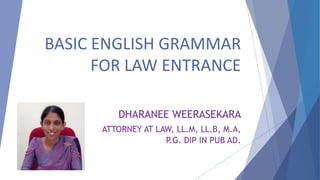The document provides an overview of basic English grammar for law entrance, including explanations and examples of how to use the present simple, present progressive, present perfect, present perfect progressive, past simple, past progressive, past perfect, and past perfect progressive tenses. It discusses the formation, use, and common time phrases associated with each tense. Examples are provided to illustrate the different tenses. The document concludes with an exercise asking the reader to complete 30 sentences by selecting the appropriate verb tense.















